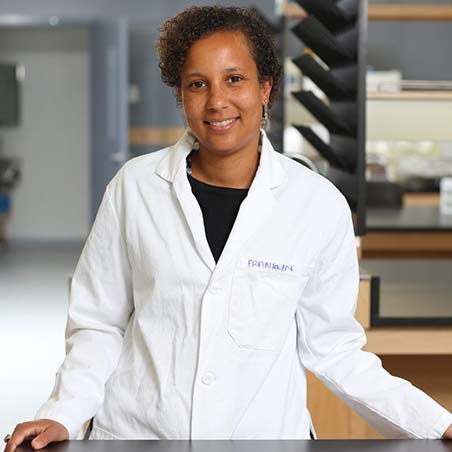Tamara Franklin
Associate Professor, Department of Psychology and Neuroscience, Dalhousie University
Bachelor of Science (Hons), 2003
We are limited by the thing we are trying to understand.
Tamara Franklin faces a conundrum in her research.
“We are limited by the thing we are trying to understand,” she says.
That “thing” is the human brain. Think about that.
Tamara is Associate Professor in the Department of Psychology and Neuroscience at Dalhousie University. It is the culmination of two decades of study and research into the wildly complicated universe of our brains. She initially imagined herself as a forensic psychologist, then as a counsellor, but once she began to take neuroscience classes she just never stopped. She received the Dr. Carrie Best Scholarship and she says that generous award allowed her to escape the dreaded threat of student debt and continue her education. Her BSc led to an MSc at Dal, a PhD in Switzerland and then a post-doc position in Italy—along the way focusing on such things as epigenetics and how negative social experiences can cause brain changes that could be related to depression.
“I don’t have a single question. I like to pursue interesting things. So when I see a question opening up I just go for it. But mainly, what I have always been interested in is how the environment impacts the brain—how it changes who we are and what we become, how stressors work on the brain. In general it is about brain plasticity.”
Some of Tamara’s research involves investigating the brain function required to drive social interactions.
“Social behaviour is one of the most complex things that we do. To act appropriately within a social context is super complicated, with so many inputs and outputs that are changing and flexible—I have become interested in how that all functions within the brain, the different areas of the brain and the pathways.”
Tamara took all her science classes for her undergrad at Dal, but in her first year she lived in residence at King’s. It was a brand new experience.
“I was in Alex Hall,” she explains. “Growing up I never went to summer camp or anything so this was my first time living with other people my age. I met all types of people. They were all doing ‘non-sciencey’ things. So I got all the leftover books from the Foundation Year Program (FYP). I read a lot. My friends talked about what they were learning so I got exposed to a lot of books and ideas that I wouldn’t have if I hadn’t been in King’s residence.”
It is interesting to imagine how Tamara’s own brain changed as she made new neural connections from those books and conversations in Alex Hall!
Along with teaching Tamara is also committed to helping students in other ways.
“The mentorship you have is so important. I have had many woman mentors. Now I get to mentor a number of students in my lab. I am also one of the Black Student Advising Centre mentors. And I do a lot of equity, diversity and inclusion (EDI) work within the university and the neuroscience community.”
Tamara has a full plate with that work, teaching and her research. But as for being limited by the thing she is studying Tamara smiles, knowing that limit is still a ways off.
“Fortunately we have only scratched the surface of brain research.”
Date posted: December 2020
